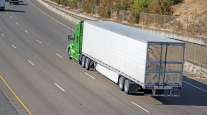Letters to the Editor: Ban on Independents, Exporting U.S. Diesel, Ticketing Truckers, Fuel and Emissions
These letters appear in the May 26 print edition of Transport Topics. Click here to subscribe today.
Ban on Independents
In response to the Los Angeles Port Authority’s looming ban on owner-operators, it never ceases to amaze me that our governmental bodies believe they have autonomous authority over all things (5-19, p. 4; click here for previous Web story).
 They have no right to regulate work rules, as they seem to believe they can, and taxpayers’ dollars will be spent defending an indefensible position when American Trucking Associations files suit.
They have no right to regulate work rules, as they seem to believe they can, and taxpayers’ dollars will be spent defending an indefensible position when American Trucking Associations files suit.
It will be just another added cost to American consumers — exactly when they don’t need it — and there are doubts the ban will have any effect on pollution.
The effort would be better spent trying to get the steamship lines to clean up their act and stop polluting our waters by dumping ballast.
Dale Valenti
Corporate Logistics Manager
Menu Foods
Emporia, Kan.
To the Port of Los Angeles Commissioners: Please take the following facts into consideration concerning the part of your Clean Air Action Plan requiring drivers to be employees (and, apparently, Teamsters).
As former safety director of off-site depot Shippers Transport Express, I also was de facto safety director for trucking company Maritech Leasing, because both had the same parent company — SSA/Carrix. Maritech operated in the Port of Long Beach with 43 drivers on average — all Teamsters.
Maritech always struggled to make a profit. A major part of its operation was picking up containers at three piers run by the parent company and draying them to STE’s depot. All this movement occurred at the night gate.
While I was safety director, Maritech struggled to get driver applicants, and most drivers I road-tested for them had little or no port experience. During this time, the union tried to recruit drivers and pushed for them to become employees instead of independents.
Here was a historic opportunity for the Teamsters and drivers — a port company hiring employee union drivers. So why were none of these Teamsters drivers who had great port experience rushing to break down Maritech’s doors seeking a job?
The Teamsters claim that a vast majority of drivers want to join them and become employee drivers, but at a joint meeting of the ports of Los Angeles and Long Beach of approximately 16,000 drivers who supposedly supported the employee-driver program, only about 150 drivers attended.
If the commissioners want to do the best thing before voting on the employee provision, they should visit the ports unannounced — without Teamsters or trucking company officials knowing in advance — and interview drivers at random, asking:
• Do you want to be an employee or stay an owner-operator?
• What do you think the problem is with the ports and trucking in and out of them?
• How can we fix it?
You might be surprised to find most drivers enjoy the freedom of coming and going as they please, an opportunity they would lose as employees. Probably most would say the biggest problem is getting into and out of a port in a timely manner, and they don’t like sitting for up to four hours trying to take a container out of a terminal. No number of employee drivers will fix that problem, which is the responsibility of the terminal and shouldn’t be thrown on the backs of the trucking companies.
Because Maritech had Teamsters employee drivers and was part of the same parent company as off-site depot STE and both companies worked terminals owned by the parent company, they had everything stacked in their favor and should have been the most profitable and successful operation out there.
Instead, Maritech Leasing recently ceased trucking operations, laying off all its Teamster drivers. If a company with so much in its favor struggled, how will companies without its advantages survive?
This is a real-life case study showing the employee program does not work for port operations, particularly when most drivers want to remain independent and live the American dream of owning their own business and leaving something to their children. Don’t take that dream away from them.
Ernie Galindo
Manager
Premier Safety Compliance
Long Beach, Calif.
Exporting U.S. Diesel
The fact that China is stockpiling diesel for the summer Olympics is understandable, to a degree (click here for previous Web story).
The part I don’t get — and I’m sure a lot of people here in the United States don’t understand — is why this country is so worried about exporting more oil to other countries when it is needed here?
Of course, the government is making money from exporting oil, but who are the ones really paying for that? We, the consumers, are.
I work in the transportation industry, and trust me, many people are suffering right now — especially the owner-operators. Large transportation companies also suffer, but they can make up some of their losses in volume. The small owner-operators with only one or two trucks are the ones really suffering. Something has to happen very soon, before things get worse.
Javier Garibay
Sales Representative
Arrow Trucks Sales
Stockton, Calif.
How insane is this? The United States is exporting diesel, helping to increase the price of diesel for its own people.
Canada, which exports oil to us, does not show a shortage of diesel, and the fuel there is about a third cheaper than in this country.
How can we even think about exporting oil? Are we now part of OPEC and charging ourselves OPEC prices? No diesel should be exported from the United States to any country at this time.
Lester Rosen
Operations Manager
Freight For Les
New York
Ticketing Truckers
It is good to see the increase in cooperation between trucking companies and law enforcement and the combined effort being made to improve responsible driving habits of the motoring public (5-19, p. 31; click here for previous Web story).
There is a perspective available from the cab of a truck that law-enforcement agencies have found to be an effective tool in traffic enforcement. Many drivers appear to exhibit more aggressive driving habits when around trucks, whether intentional or not, and this system addresses this behavior more effectively.
Perhaps the success of this program will lead to increased education in high school-level training programs for new drivers and increased defensive-driver training at the professional level.
I believe developing awareness and proper driving technique in the presence of heavy trucks at the student-driver level is much more effective than changing the habits of experienced drivers who already “know it all.”
I hope the program will expand to other agencies across the country.
John Kane
Driver Trainer
Flying J Transportation
Oldsmar, Fla.
I can understand Oregon police riding shotgun with truckers and ticketing unsafe drivers — as long as they look at truckers as well.
It’s not uncommon for me to see a loaded tractor-trailer riding about 15 feet behind a car, and nothing makes me more upset. If that car needed to stop quickly, there is no way a truck would be able to stop fast enough.
I’m sure it’s frustrating for truckers to get cut off by cars, so they want to ride close to prevent that — or is it just because they’re mad about being cut off?
But the truckers are the professional drivers and need to understand that they need to do what they can to keep safe distances no matter what. Some truckers don’t seem to understand that.
I personally don’t feel bad for truckers who have a bad name or high insurance costs, because some of them think they own the road and drive like it, risking everyone’s safety.
Jim Bevan
Heavy Truck Design Engineer
Freightliner
Portland, Ore.
Fuel and Emissions
I am concerned about our future — but I would like to see statistics. Slowing trucks down? My sweet spot is 65 mph; I idle at 600 rpm and can idle on a gallon of fuel for 2.5 hours. Inertia and momentum also help, especially on hills. Time, too, is a factor, as are torque and terrain. A lot goes into factoring mileage and efficiency. Let’s see some actual trials and statistics.
Mark Blackmon
Owner-Operator
Gadsden, Ala.




